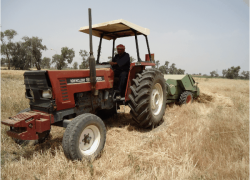
Chief Economist at Schnittker Associates, and former Ministry Advisor at the US Embassy in Baghdad.
Iraq's 2013 winter grain prospects appear to be good to excellent condition at this time. Late fall and early winter rains as well as irrigation supplies have been adequate to support increased plantings and good early growth of the critical wheat and barley crops. Satellite imagery and field reports also indicate a positive outlook from the principal growing provinces.
However, as harvest is still four months away, and with the bulk of the wheat and barley crops water requirements yet to be met, it is premature for Iraq to assume a bin busting crop. But the good condition of the crop and adequate soil moisture supplies have created the potential for Iraq's best wheat and barley crops in many years.
Spring rains and irrigation water availability will ultimately determine if this year's crop is a success. Irrigation water management during March and April will be especially important. A successful harvest is especially needed across the North where short crops and outright crop failures in recent years have seriously hurt the agricultural sector.
The northern provinces of Iraq and Kurdistan are heavily dependent upon winter rains, putting crop production in these areas at the mercy of mother-nature, while the remainder of Iraq is primarily irrigated.
Iraq's irrigation water supplies for both the winter grain crop and spring and summer crops such as corn and rice are heavily dependent upon winter rain and snow that falls across Eastern Turkey; to date precipitation across this region has been somewhat spotty. However, there is still time for heavy widespread precipitation to fall before winter and spring storm systems disappear in mid to late April.
Fair weather is in the forecast for Iraq over the next 7-10 days, but after that the long-range weather models suggest a stormy period around the end of the month.
A bumper crop in 2013 could result in as much as an additional $250 million in farm receipts flowing through the rural economy. Farm income could also see a sharp increase, setting the stage for new investments in farm machinery and irrigation equipment. Politically, a big crop would increase stability in rural areas as increased crop receipts move through the rural economy, creating new jobs and giving credence that Iraq is meeting its ambitions to become more self-sufficient in food.

